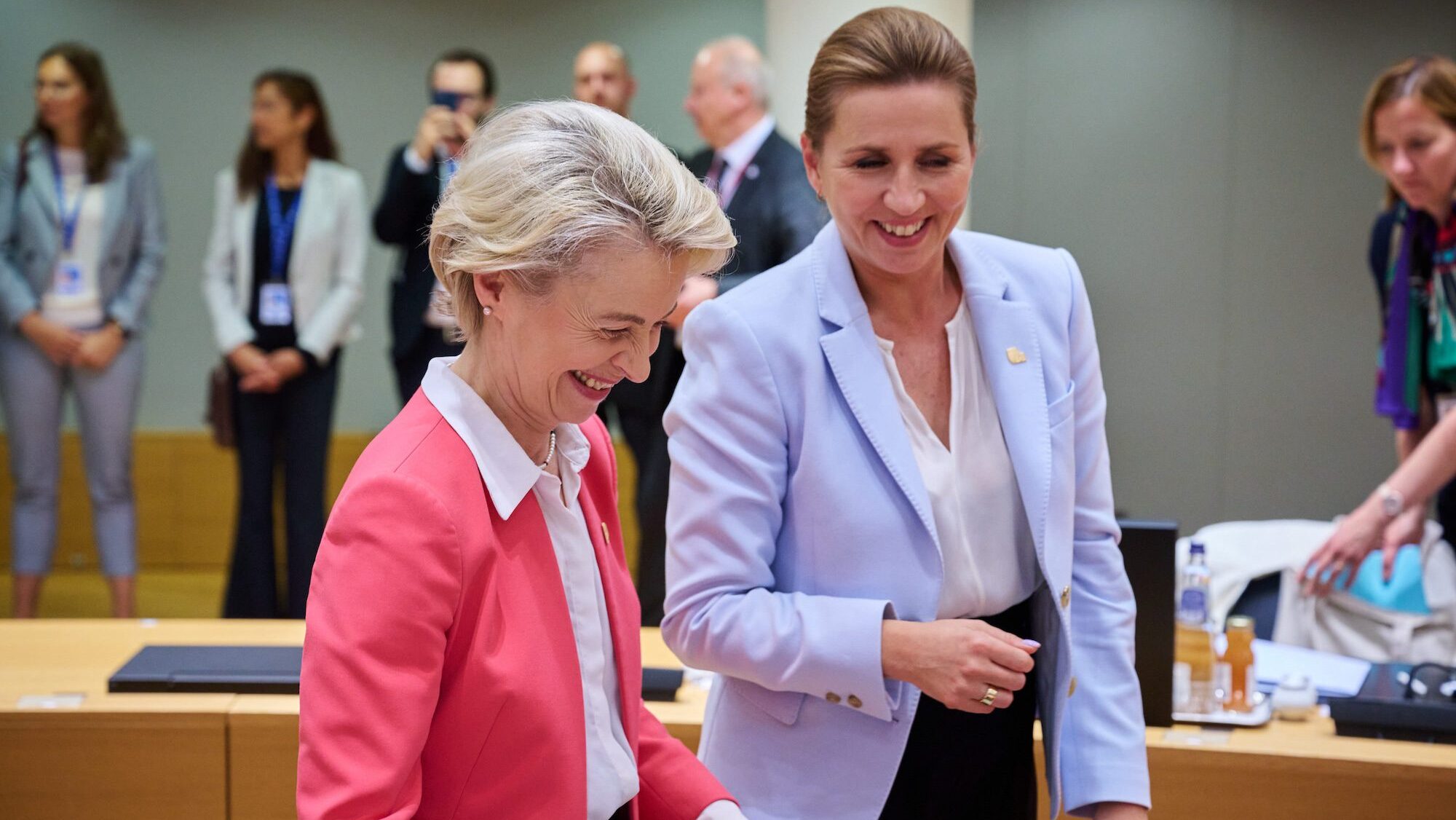
EU Commission President Ursula von der Leyen with Danish Prime Minister Mette Frederiksen.
Photo: Dati Bendo © European Union, 2023. Source: EC – Audiovisual Service
The European Commission will work on a fresh legislative package to streamline the deportation of illegal migrants as a “top priority” in its new mandate. A first draft will be circulated around the capitals as soon as early February, according to a report in Politico, citing three unnamed EU officials.
This comes after the European Council summit in October called on the Commission to introduce significantly tougher rules in the EU’s asylum system. In particular, they asked for streamlining returns—as only about 19% of those with deportation orders actually leave Europe—and setting up off-shore “return hubs,” like Italy’s two asylum centers in Albania.
Readers may recall that the first von der Leyen Commission’s flagship Migration Pact was one of the hardest policy packages to reach a consensus on. It was only adopted right before the EU Parliament elections because the Council moved the final votes to the ministerial level, where no individual member state could block it with a veto.
Yet almost immediately after adopting it, a majority of member states realized that the conservative opposition to the policy from countries such as Poland and Hungary was not without merit. The Pact failed to address several key issues, including efficient external border control, preventing secondary movements, and facilitating returns of failed asylum seekers.
Rallying around a Czech-Danish initiative, member states called on Brussels to complement the pact with a new package that should also include some sort of EU version of Italy’s ‘Albania protocol,’ establishing third-country reception and deportation facilities outside of the EU to prevent illegal migrants escaping authorities by disappearing within the borderless Schengen Area.
While Politico presents it as if von der Leyen and her new Commission demonstrate that they heard leaders “loud and clear” by focusing on the new “Returns Directive,” in truth, it’s only because the calls are now coming from establishment circles, e.g., prime ministers Donald Tusk (Poland) or Mette Frederiksen (Denmark). Conservative lawmakers both in the capitals and in Brussels have only received condemnation and ridicule from von der Leyen for suggesting the same measures while the Migration Past was still being negotiated.
Regardless, the Returns Directive can be a welcome step forward, but member states must also ensure that it’s not only for show—either by Brussels or mainstream governments who, seeing a populist surge in their countries, suddenly try to hijack the conservative agenda by pretending to care. Instead, it must be an effective toolbox to control illegal migration to Europe.
According to the diplomats cited by Politico, the Commission is still going back and forth with the capitals about what exactly they expect to see in the package. Not much is known at the moment, but they mentioned a few elements that will likely be featured.
One approach would be allowing countries to restrict the freedom of movement of failed asylum seekers while they are waiting for their deportation orders, to prevent internal movements within Schengen (for example by ordering them to “check in” to a migrant center). It may not seem much, but it would be a huge step forward compared to the Migration Pact, which generally outlaws the detention of illegal migrants, making it very difficult to catch them once their asylum claims have been rejected.
Of course, clarifying rules around deportations will be the main objective of the package, and the officials said member states might be able to choose between returning failed asylum seekers to their home countries or transit countries where they lived and worked for longer periods. This could be controversial—think of Turkey and its track record of mistreating migrants—and both options hinge on the EU’s ability to convince third-party countries to accept the deportees.
Finally, the EU-wide implementation of something similar to the Albania protocol is still on the table, even if the leftist half of the EU Parliament constantly portrays it as a violation of fundamental rights—and activist judges in Italy do everything in their power to prevent the government from using the outsourced facilities.
But according to one diplomat, the current pressure from member states is too great for Brussels to ignore. “A few years ago these positions [about swifter deportations and running off-shore asylum centers] were perceived by many as too problematic. The Commission didn’t want to hear about it,” he said. “Now, it’s mainstream.”
